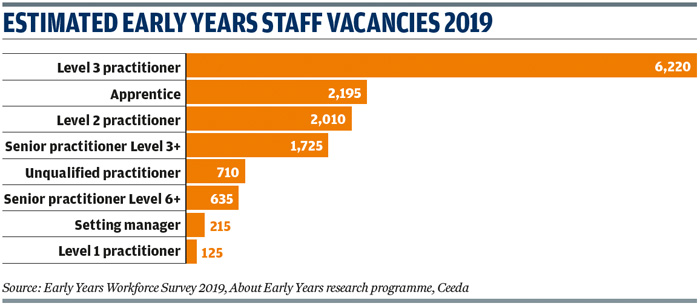
The early years sector faces ongoing challenges in recruiting and retaining staff. There are concerns government plans for a points-based immigration system will exacerbate the situation, as an estimated 9,150 nursery workers are EU nationals, and nursery workers are not on the current list of shortage occupations.
However, the financial impact of Covid-19 since March is already causing settings to close, which may cause vacancies to fall. The National Day Nurseries Association (NDNA) has launched a year-long research project with the Education Policy Institute to look at the impact of Covid-19 on the early years workforce.
Since August 2015, the number of registered childminders has dropped by 23 per cent. The Professional Association for Childcare and Early Years (Pacey) is working with Plymouth University to find out why more childminders are leaving the profession and fewer are joining it.
In March 2020, a group of early years experts and sector organisations launched the Early Years Workforce Commission. The group aims to develop recommendations around areas including improving the basic training of those entering the sector, improving quality and take-up of continuing professional development (CPD) for those already in the sector and improving recruitment and retention across the workforce.
Early years settings must meet specific requirements for the ratio of qualified adults to children, including rules about the proportion of staff with Level 2 and Level 3 qualifications. Since September 2019, those wanting to work as an accredited Level 2 practitioner must take one of a number of qualifications endorsed by the Department for Education, either as standalone qualifications or as part of the Children and Young People’s Workforce Intermediate Apprenticeship Framework.

In March 2020, a new Level 2 apprenticeship standard for early years practitioners was approved for delivery. Aiming to support unqualified childcare staff to progress their careers, the standard was created by a trailblazer group headed by the Early Years Alliance’s director of quality improvement, Michael Freeston. A Level 3 Early Years Educator Apprenticeship was launched in April 2019.
The NDNA has developed three online courses which contribute towards the Level 3 Diploma in Childcare and Early Education: Understand the Value of Play in Early Years; Plan, Lead and Review Play Opportunities; and Promoting Children’s Personal, Social and Emotional Development.
Early Years Teacher Status (EYTS) was introduced in 2013 in an effort to create a graduate-led workforce. The number of students enrolling on Early Years Initial Teacher Training courses fell from 574 in 2016/17 to a provisional 352 students in 2019/20. There are three routes into EYTS: undergraduate, taken by only two trainees last year, postgraduate employment-based, taken by 309, and graduate entry taken by 43. EYTS is considered the equivalent of Qualified Teacher Status, but does not bring equivalent pay and early years teachers cannot lead nursery or reception classes in maintained primary schools.
In March 2020, Pacey launched EY Smart, a free digital CPD resource for practitioners in England and Wales developed in conjunction with the Open University. In response to the pandemic, it now includes courses to support all practitioners to navigate the “new normal” including a risk assessment template.
From September 2020, 33 colleges will offer the new Education and Childcare T-Level. The two-year college-based vocational programme at Level 3 is equivalent to three A-levels and includes a minimum of 315 hours of work placements. Participants can specialise in Early Years Education and Childcare, Assisting Teaching or Supporting and Mentoring Students in Further and Higher Education.
NDNA Cymru’s Welsh government-funded Childcare Works programme will run to March 2021, working with 33 Trainee Nursery Assistants across four local authorities. The programme has been revised to include three weeks online training.
In January 2020, Cache launched a Level 4 CPD qualification to support practitioners to take on the role of Physical Activity and Nutrition Co-ordinator, leading and supporting change within the setting.
BB Training, part of the Busy Bees Group, has launched a bespoke consultancy service to support settings to navigate the updated Ofsted early years inspection framework, which came into operation in 2019.
Nasen (National Association for Special Educational Needs) offers free resources around special educational needs and disabilities (SEND) for all education staff in early years, including webcasts highlighting best practice and mini-guides focusing on different sectors. The organisation also provides training and support in all aspects of SEND.
NEW MEN-ONLY EARLY YEARS APPRENTICESHIP
Fewer than four per cent of early year practitioners are male. With the early years sector suffering a chronic crisis in staff recruitment and retention, it makes sense for childcare organisations to target this untapped market. Not only that, but research shows a gender balanced workforce helps shape children’s view of the world, their aspirations, choices and social achievements.
In September 2020, the London Early Years Foundation (LEYF) launched what it believes is the sector’s first ever male-only apprenticeship. The programme – run in partnership with the University of Wolverhampton – had been due to start in March, but like all LEYF’s apprenticeships was postponed due to the pandemic.
Men applying to the scheme need to have a grade 4/5 in English GCSE and grade 3 in Maths. They will take part in a 12- to 18‑month training programme, with an annual salary of between £12,000 and £16,000, and a wage increase in the second year. All apprentices who successfully complete the course are guaranteed an interview for a LEYF teacher post. “We are looking for 12 to 14 candidates,” says Nick Corlett, senior nursery manager at LEYF.

